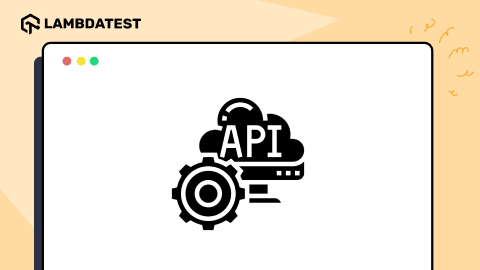AI in Mobile Testing: Tools and Best Practices
Zikra Mohammadi
Posted On: November 20, 2024
![]() 63862 Views
63862 Views
![]() 15 Min Read
15 Min Read
Testing mobile applications has become a real challenge with the variety of devices, OS versions, and use cases. Traditional testing methods often struggle to keep up with faster mobile testing cycles.
This is where leveraging AI in mobile testing makes your test automation process even more smarter. It simplifies the process by automating repetitive tasks, spotting potential issues early, and ultimately ensuring users get a smooth mobile experience.
In this blog, we discuss AI in mobile testing and outline best practices for effectively integrating AI into the testing strategy.
TABLE OF CONTENTS
What Is AI in Mobile Testing?
AI in mobile testing refers to the use of artificial intelligence technologies to improve the efficiency, accuracy, and speed of testing mobile applications. It leverages machine learning, natural language processing, and other AI techniques to automate repetitive tasks, generate test scripts, and detect bugs.
It can analyze test logs, identify potential issues, and predict mobile application behavior to ensure better test coverage. AI can also predict areas of the mobile application that are likely to fail, allowing testers to focus on high-risk areas, and it can monitor performance under different conditions, suggesting optimizations for a better user experience.
Why Use AI in Mobile Testing?
AI has become the game-changer in testing mobile applications, which opens up new doors to handling complexity and increasing the accuracy of the testing process. Developers and testers can now make their workflows more efficient, minimize manual effort, and increase accuracy and efficiency.
Let’s find out the major roles AI plays in revolutionizing mobile application testing.
- Automated Test Generation: AI-based test creation can help generate test cases based on user behavior and previous data. It ensures thorough test coverage and identifies cases that manual testing may overlook.
- Predictive Analysis: AI can predict possible issues and performance bottlenecks before they arise. By examining patterns and trends, AI assists developers in proactively addressing problems, resulting in a better user experience.
- Quick Feedback: AI can accelerate testing by automating monotonous processes while also performing tasks in parallel. This way, feedback is given to developers quickly, and they can go through multiple cycles of development quickly and enhance the quality of the apps being developed.
- High Accuracy: AI can process a large amount of data with high accuracy, thus minimizing the chances of human errors in terms of test execution and analysis.
 Note
NoteTest across real Android and iOS devices on the cloud. Try LambdaTest Today!
How to Perform AI Mobile Testing?
Using AI in mobile testing can make the process easier by automating repeated tasks, simulating real-life scenarios, and highlighting issues while maintaining a consistent user experience.
Here are the steps to successfully perform AI testing of your mobile applications:
- Define Testing Scope and Objectives: Identify key features and set performance benchmarks for the mobile app.
- Choose AI-Powered Tools: Use AI testing tools for intelligent element detection, visual testing, and self-healing capabilities.
- Set Up Testing Environment: Use emulators, simulators, or cloud-based device farms to cover diverse device configurations.
- Create AI-Augmented Test Cases: Leverage AI to generate automated tests and manage edge cases effectively.
- Analyze Test Results With AI: Perform root cause analysis, saving time on debugging and troubleshooting.
- Integrate With CI/CD for Continuous Testing: Incorporate AI testing into CI/CD pipelines, focusing on high-risk areas to optimize test execution.
- Continuously Improve AI Model and Strategy: Update the AI model regularly with new data to enhance predictive accuracy, optimize test cases, and expand test coverage as the app evolves.
Using AI, you can manage and generate your test cases as well by using an AI-driven test case manager.
Cloud-based testing platforms like LambdaTest offer a unified AI-infused Test Manager that lets you simplify, manage, minimize errors, and save valuable time. You can create and organize test cases in one place, generate test plans, and execute them on LambdaTest while monitoring test run progress.
AI Tools for Mobile Testing
AI testing tools have proven invaluable when testing the quality and functionality of mobile applications. These tools use AI to automate complex testing processes, improve accuracy, and accelerate the entire testing process.
KaneAI
KaneAI is an AI Native QA Agent-as-a-Service platform designed for high-speed quality engineering teams. Powered by modern Large Language Models (LLMs), KaneAI enables testers to develop, debug, and evolve mobile application tests in natural language using frameworks like Appium, making the testing process more intuitive and efficient.
Key features:
- Intelligent Test Generation: Simplifies test creation and evolution using Natural Language Processing instructions.
- Intelligent Test Planner: Automatically generates and automates test steps from high-level objectives.
- Multi-Language Code Export: Converts automated tests into all major languages and frameworks.
- Smart Show-Me Mode: Translates actions into natural language instructions to create robust tests.
- 2-Way Test Editing: Syncs changes between natural language and your code edits.
- Auto Bug Detection and Healing: Automatically detect bugs during test execution and resolve them.
- Effortless Bug Reproduction: Reproduce and fix bugs by manually interacting, editing, or deleting test steps.
With the rise of AI in testing, it’s more important than ever to stay ahead by enhancing your skills. The KaneAI Certification validates your practical expertise in AI Native testing and positions you as a future-ready, high-value QA professional.
Aqua Cloud
It is a comprehensive AI-powered test management tool that uses intelligent automation to perform mobile application testing. It includes several major AI-driven features that significantly improve testing speed and accuracy by minimizing manual work and optimizing testing cycles across various devices.
Key features:
- AI-Generated Test Cases: Generates complex test cases that cover a wide range of scenarios, reducing manual efforts.
- Self-Healing Test Scripts: Updates test scripts when mobile application elements, ensuring smooth and reliable test execution by preventing broken tests.
- Defect Detection and Insights: Provides real-time defect detection, predicting potential areas of failure before they impact the user experience.
Functionize
It is an intelligent test automation platform that makes the process of testing web and mobile applications easier and highly efficient. Functionize uses artificial intelligence to deliver better efficiency and effectiveness in mobile application testing while working towards the goal of providing consistency in delivering high-quality mobile applications faster.
Key features:
- AI-powered Test Creation: Uses advanced natural language processing to enable testers to write tests by only outlining the intended functionality in plain English.
- Self-Healing Tests: Uses AI to detect changes in the mobile app’s UI and automatically adapt existing tests.
- Test Scaling and Execution: Uses cloud infrastructure to scale tests across multiple devices and operating systems.
Katalon
It is a comprehensive test automation solution that provides a reliable platform for testing mobile applications. Katalon’s AI-powered capabilities simplify the testing process, increase efficiency, and enable continuous delivery.
Key features:
- Smart Test Generation: Generates automated tests based on manual test cases existing anywhere within no time.
- Intelligent Object Recognition: Detects UI elements across several devices and screen sizes, ensuring that testing results are constant and avoids the need for human efforts.
- Automated Maintenance: Detects changes in the mobile application and updates test scripts accordingly, significantly reducing the time and effort required to maintain test cases.
Shortcomings of AI in Mobile Testing
While AI has the potential to revolutionize mobile testing, there are some shortcomings to consider. Understanding these allows teams to better prepare for and handle them, ensuring that AI is used successfully and ethically.
- Initial Learning Curve: Implementing AI mobile testing necessitates a certain amount of skill and knowledge. Teams must grasp how AI algorithms operate, how to train models, and how to evaluate the results. This initial learning curve might be high, necessitating investment in training and skill development for the team.
- Cost of Implementation: AI mobile testing tools implementation can be costly, particularly for small organizations. It would be a strain on the budget to implement testing tools, infrastructure, and training powered by AI.
- Lack of Contextual Understanding: AI can struggle to comprehend the context and intricacies of human language and behavior. While AI is very good at many things, it lacks the instincts and contextual sensitivity for the intuition that naturally comes to the human tester, thus leaving gaps in testing and oversight of important things.
- Integration With Existing Tools: Integrating AI tools into current testing frameworks and DevOps pipelines might be difficult. Compatibility challenges, data transfer complications, and workflow disruptions may occur.
- Data Privacy and Security: AI mobile testing frequently requires enormous volumes of data to work properly. Ensuring the privacy and security of sensitive data is crucial, as a breach could have serious consequences. To protect user information, organizations must establish strong data security procedures and follow applicable rules.
Best Practices for Using AI in Mobile Testing
To leverage the full potential of AI in mobile testing, there is a necessity to follow best practices that guide teams through the full integration of AI within their workflow.
Let us look at some of these best practices:
- Collect Diverse Data for Testing: AI algorithms perform better with diverse and comprehensive data. Collect diverse data from various user demographics, devices, and usage habits to train your AI models.
- Prioritize Test Case Selection: Set priorities in test cases based on importance, risk, and impact on the mobile app. AI can assist in figuring out how to focus efforts on the most important test cases first so that the most important areas of the app are tested properly.
- Generate Comprehensive Test Scenarios: Use AI to generate comprehensive test scenarios covering all possible app user interactions. This includes simulating real-world usage patterns and identifying potential issues that may arise in different scenarios.
- Convert Manual Test Cases With NLP: NLP would make the test cases written in manual mode easier to translate into an automated script. This way, with the use of natural language for describing test scenarios, AI-powered tools can automatically generate executable test scripts, reducing the manual effort required and making the testing process more accessible.
- Combine AI With Manual Testing: AI can automate most of what is to be tested, while a combination of AI and manual testing will ensure comprehensive test coverage. Manual testing will naturally encompass subjective aspects of user experience that AI lacks and complex scenarios where human intuition is needed.
Subscribe to the LambdaTest YouTube Channel and stay up-to-date with more such tutorials.
Future of AI in Mobile Testing
The future of AI in mobile testing is poised to transform the industry, making testing more efficient, accurate, and thorough. Predictive and automation capabilities of AI can help ensure higher-quality mobile applications and faster delivery times, hence improving the user experience.
Let’s look at what the future holds for AI in mobile testing:
- AI-Powered Test Generation and Execution: AI algorithms are now capable of generating test cases based on user behavior patterns and mobile application functionalities. This saves time and uncovers edge cases that human testers might overlook, ensuring comprehensive coverage and higher quality assurance.
- AI-Augmented Test Automation: AI in test automation enhances existing test automation frameworks, improving test efficacy and reducing delivery cycles. This means faster and more reliable testing processes, as AI continuously learns from test executions and refines test cases to stay relevant and effective.
- AI-Powered Visual Testing: AI drives visual testing capabilities, leveraging computer vision to detect visual discrepancies. By comparing the current state of the mobile application with reference images, AI can identify visual defects and maintain a consistent user interface across different devices.
- Natural Language Processing for Test Automation: NLP makes the creation and ongoing management of test scripts easier by allowing testers to describe test situations in natural language. AI-powered technologies then turn these descriptions into executable test scripts, simplifying the testing process and shortening the learning curve for new testers.
- Bug Resolution With Predictive Analytics: Machine learning models are trained to detect probable issues and bugs before they arise, resulting in proactive fixes and higher-quality products. By examining previous data and recognizing patterns, AI can let developers know of future vulnerabilities, allowing them to address them before they affect consumers.
- AI-Infused DevOps: AI eases collaboration within DevOps teams, and auto-triggers functions faster, streamlining the entire development and testing pipeline. This integration ensures seamless communication and efficient workflows, reducing the time required for testing and delivering high-quality mobile applications quickly.
- AI-Driven Performance Testing: AI optimizes performance testing by simulating various user scenarios and network conditions. This allows AI to identify bottlenecks and optimize the mobile app’s performance, ensuring a smooth and responsive user experience across different environments.
Various cloud testing platforms offer AI-powered visual testing of mobile applications. One such platform is LambdaTest, which offers an AI native SmartUI platform to perform visual testing of mobile applications using frameworks like Appium.
Check out this guide to get started with Appium visual testing on LambdaTest.
You can also run performance tests at scale by leveraging AI-native HyperExecute, an end-to-end test orchestration platform that is up to 70% faster than traditional cloud grids.
To get started, head over to this guide on performance testing with HyperExecute.
Conclusion
AI in mobile testing is changing the way developers and testers quality, efficiency, and scalability of mobile applications. Teams can use powerful AI tools to automate tedious processes, forecast future issues, and ensure more comprehensive test coverage across several devices.
While Generative AI in testing speeds up the testing process and lowers human efforts, it may come with a few challenges, such as high implementation costs, integration issues, and the requirement for experienced teams to maintain the models.
To fully harness AI capabilities, it is critical to integrate AI-driven testing with manual efforts. The future of AI in mobile application testing looks bright, with advancements in AI-powered test generation, test authoring and reporting.
Frequently Asked Questions (FAQs)
What is AI ML testing?
AI and ML in test automation use algorithms to forecast potential software issues based on previous test data. This predictive feature enables testers to proactively fix error-prone areas, hence enhancing software quality.
How can AI be used for testing?
AI-powered testing improves test results by reducing human errors and biases. Through advanced analytics and predictive modeling, AI testing tools can discover anomalies, expose hidden faults, and identify risk areas with better precision.
How is AI used in mobile?
AI in mobile enhances user experience with features like voice recognition, image processing, and personalized recommendations.
Can we automate mobile testing?
Yes, mobile testing can be automated, and it has become an essential component of the mobile development process. Mobile testing automation involves using multiple tools and frameworks to test mobile applications in different environments.
Got Questions? Drop them on LambdaTest Community. Visit now














